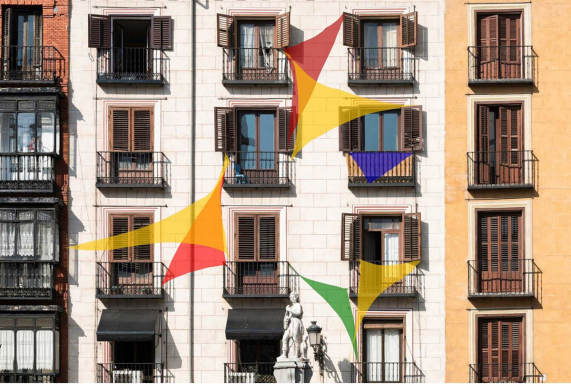Presented by The Cultural Services of the French Embassy in the United States, as part of Oui Design and in collaboration with WantedDesign, the French-American Online Design Schools Workshop brought together 34 international students from 11 American and French schools to respond to the pandemic crisis and find creative solutions to offset the financial, health, mobility and community impacts of COVID-19.
Still United, focusing on the concept of mutual aid and how Coronavirus has been revitalizing the concept of community for the 21st century, was awarded Best Project. Developed by students Alexiane Capitaine (École Estienne), Anton Blondeau (Strate), Eugenie Zuccarelli (ENSAD), Hadley Feingold (Parsons), Naelle Frega (ENSAAMA), and Pietro Quintino Sella (Pratt), the winning team created a tool kit that can be used as a communication signal to offer aid to neighbors during and after the pandemic. The 9 other projects can be viewed here.
The Workshop
Co-led by Sophie Larger of École Nationale Superieure des Arts Décoratifs (ENSAD) and Allan Chochinov of the School of Visual Arts (SVA), Products of Design, the online workshop took place on Zoom from Wednesday, May 27th through Friday, May 29th, 2020.
The 34 students came from leading French and American design schools, including ENSAD, PARSONS, SVA, École Estienne, ENSCI Les ateliers, ESAAT, ENSAAMA, Strate School of Design, PRATT Institute, RISD and SAIC.
Organized in 10 transatlantic teams, the students collaborated virtually from their homes for 3 days to create projects addressing the urban responses to the COVID-19 public health crisis. Led by teams of referees and mentors from ENSAD, Parsons and École Estienne, the students from diverse cultural and educational backgrounds came together to share compare experiences of the pandemic on both sides of the Atlantic and use this dialogue to inform and craft design solutions to inadequacies they perceived in the spheres of Healthcare; Mental Health; Mobility and Public Spaces; and Community and Communication.
The jury, chaired by Allan Chochinov, and including Julie Lasky, matali crasset, Amélie du Passage, and John Edelman, reviewed the 10 projects and bestowed the title of Best Project on Still United, developed by students Alexiane Capitaine, Anton Blondeau, Eugenie Zuccarelli , Hadley Feingold, Naelle Frega, and Pietro Quintino Sella.
The Winning Projects
Still United is a kit containing coded stickers, posters, and swaths of fabric to be displayed within and outside residential buildings by residents according to what services inhabitants are willing to provide to their neighbors, who might be more vulnerable to the pandemic (ex: grocery shopping or doing laundry).
“Using simple means for maximum effect, Still United promises to accomplish several goals: provide a way for members of a community to receive assistance from their neighbors; create a supportive feeling among people who might otherwise feel alienated and isolated in a pandemic; beautify neighborhoods through colorful graphics; and inspire other communities to do the same. Still United shows how we can safely maintain a physical connection through the proxy of these graphics and the help they represent.” stated Julie Lasky, jury member and journalist at the New York Times.
Second place was shared by the projects LISTen and Sanny. Developed by Kazuki Guzmán (SAIC), Laura Jaramillo (RISD) and Naïs Hoang (École Estienne), LISTen consists of digital communication tools (an app and newsletter) aimed at facilitating open conversations and strengthening interpersonal relationships during a pandemic-related confinement, in order to offset the threat of domestic physical and emotional abuse. Sanny was created by Allison (Han-Yu) Yang (Pratt Institute), Bart Haney (SVA) and Emilie Durand (Strate School of Design): a trio of bags (Grocery Bag, Tote and Pouch) filled with sanitizing LED strips which illuminate with UV-C light, the project aims to radically reduce the spread of bacteria and viruses into our homes.
“In a globalized world, collaboration across borders is not optional, but essential to achieving better understanding and better answers. But this collaboration is exactly what has been threatened by the crisis, and we need to fight to maintain it for years to come. The international design community is not so much a given in our current times as a precious network we must foster every day. This is what we are proud to do at the Cultural Services of the French Embassy with the Oui Design program, and this is why, with WantedDesign, we were so happy to be able to transition the workshop into an online format. Congratulations to the winner!” said Gaëtan Bruel, Cultural Counselor of the Embassy of France in the United States
The French-American Online Design Schools Workshop is presented by the Cultural Services of the French Embassy in the United States as part of Oui Design, in collaboration with Wanted Design and with the support of FACE Foundation, Institut Français – Paris, and the French Ministry of Culture. We thank Core 77 as our media partner for this workshop.
Click here for more information.
About the Cultural Services of the French Embassy
The Cultural Services of the French Embassy promotes the best of French arts, literature, cinema, digital innovation, language, and higher education across the US. Based in New York City, Washington D.C, and eight other cities across the country, the Cultural Services brings artists, authors, intellectuals, and innovators to cities nationwide. It also builds partnerships between French and American artists, institutions and universities on both sides of the Atlantic. In New York, through its bookshop Albertine, it fosters French-American exchange around literature and the arts. www.frenchculture.org.
About Wanted Design
WantedDesign is a platform dedicated to promoting design and fostering an international creative community at large throughout the year. Founded in New York City in 2011 by Odile Hainaut and Claire Pijoulat, WantedDesign has established itself as a constant and staunch supporter of U.S. and international design via events, conversations and partnerships. Its yearly programing aims to nurture New York City’s design dialogue. The two main events, WantedDesign Manhattan, now at the Javits Center, and WantedDesign Brooklyn, at Industry City, take place during NYCxDESIGN, New York’s annual design festival. www.wanteddesignnyc.com
